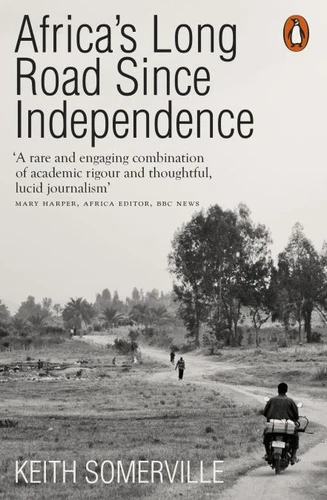Africa's Long Road Since Independence. The Many Histories of a Continent
Par :Formats :
Disponible dans votre compte client Decitre ou Furet du Nord dès validation de votre commande. Le format ePub protégé est :
- Compatible avec une lecture sur My Vivlio (smartphone, tablette, ordinateur)
- Compatible avec une lecture sur liseuses Vivlio
- Pour les liseuses autres que Vivlio, vous devez utiliser le logiciel Adobe Digital Edition. Non compatible avec la lecture sur les liseuses Kindle, Remarkable et Sony
- Non compatible avec un achat hors France métropolitaine
 , qui est-ce ?
, qui est-ce ?Notre partenaire de plateforme de lecture numérique où vous retrouverez l'ensemble de vos ebooks gratuitement
Pour en savoir plus sur nos ebooks, consultez notre aide en ligne ici
- Nombre de pages400
- FormatePub
- ISBN978-0-14-198410-0
- EAN9780141984100
- Date de parution26/01/2017
- Protection num.Adobe DRM
- Infos supplémentairesepub
- ÉditeurPENGUIN
- AuteurKeith Somerville
Résumé
'A superb book...genuinely innovative' Jack Spence OBE, King's College LondonOver the last half century, sub-Saharan Africa has not had one history, but many. Histories that have intertwined, converged and diverged. They have involved a continuing process of decolonization and state-building, conflict, economic problems but also progress and the perpetual interplay of structure and agency. This new view of those histories looks in particular at the relationship between territorial, economic, political and societal structures and human agency in the complex and sometimes confusing development of an independent Africa.
The story starts well before the granting of independence to Ghana in 1957, but the book also looks at Africa in the closing decades of the old millennium and opening ones of the new. This is a book, too, about the history of the peoples of Africa and their struggle for economic development against the global economic straitjacket into which they were strapped by colonial rule and decolonisation. The importance of imposed or inherited structures, whether the global capitalist system, of which Africa is a subordinate part, or the artificial and often inappropriate state borders and political systems is discussed in the light of the exercise of agency by African peoples, political movements and leaders.
The story starts well before the granting of independence to Ghana in 1957, but the book also looks at Africa in the closing decades of the old millennium and opening ones of the new. This is a book, too, about the history of the peoples of Africa and their struggle for economic development against the global economic straitjacket into which they were strapped by colonial rule and decolonisation. The importance of imposed or inherited structures, whether the global capitalist system, of which Africa is a subordinate part, or the artificial and often inappropriate state borders and political systems is discussed in the light of the exercise of agency by African peoples, political movements and leaders.
'A superb book...genuinely innovative' Jack Spence OBE, King's College LondonOver the last half century, sub-Saharan Africa has not had one history, but many. Histories that have intertwined, converged and diverged. They have involved a continuing process of decolonization and state-building, conflict, economic problems but also progress and the perpetual interplay of structure and agency. This new view of those histories looks in particular at the relationship between territorial, economic, political and societal structures and human agency in the complex and sometimes confusing development of an independent Africa.
The story starts well before the granting of independence to Ghana in 1957, but the book also looks at Africa in the closing decades of the old millennium and opening ones of the new. This is a book, too, about the history of the peoples of Africa and their struggle for economic development against the global economic straitjacket into which they were strapped by colonial rule and decolonisation. The importance of imposed or inherited structures, whether the global capitalist system, of which Africa is a subordinate part, or the artificial and often inappropriate state borders and political systems is discussed in the light of the exercise of agency by African peoples, political movements and leaders.
The story starts well before the granting of independence to Ghana in 1957, but the book also looks at Africa in the closing decades of the old millennium and opening ones of the new. This is a book, too, about the history of the peoples of Africa and their struggle for economic development against the global economic straitjacket into which they were strapped by colonial rule and decolonisation. The importance of imposed or inherited structures, whether the global capitalist system, of which Africa is a subordinate part, or the artificial and often inappropriate state borders and political systems is discussed in the light of the exercise of agency by African peoples, political movements and leaders.



